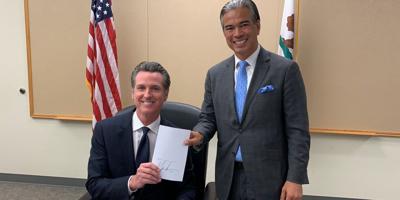
From left, California Gavin Newsom and California Attorney General Rob Bonta
SACRAMENTO - As the U.S. Supreme Court prepares to rule in coming weeks - or months - on whether fuel producers can sue the state of California over its vehicle emissions rules, California state officials have indicated they are also prepared to potentially take to the federal courts to contest the ability of even the Congress and the President of the United States to take away the state's unique ability to use its emissions rules and economic heft to effectively force the country to transition to electric vehicles.
On May 22, the U.S. Senate approved legislation that would strip California of its so-called "waiver" under federal environmental laws, giving the state, alone among U.S. states, the power to set air quality and vehicle emissions standards more stringent than those allowed under federal law.
The legislation will now advance to President Donald Trump for his signature, which is expected, given Trump's longstanding opposition to California's special powers.
The federal action comes as a response to California's refusal to back down from implementing its so-called "Advanced Clean Cars" program. That program would slap stringent regulations onto automobiles sold in California, seeking to eventually force every vehicle sold in the state to be "zero emission" by 2035 in the name of fighting so-called "climate change" allegedly caused, in large part, by so-called "greenhouse gas" emissions from the exhaust of petroleum powered automobiles.
The California gas-powered car ban was not approved by California lawmakers. Rather, it was the result of rulemaking from the state's powerful California Air Resources Board (CARB) with the backing of Gov. Gavin Newsom.
The gas car ban rules have drawn lawsuits from a coalition of oil and gas energy suppliers and others, who have asserted California has acted unconstitutionally to essentially use its special legal privileges to attempt to ban gas-powered cars nationwide.
Since the 1960s, from the earliest days of the federal Clean Air Act, California secured a special waiver from federal vehicle emissions standards allowing the Golden State to impose stricter regulations than those required by federal law.
In granting California the expanded authority, the federal Environmental Protection Agency has said the waiver is needed to allow California the flexibility to address its supposedly unique pollution problems, exacerbated by its geography and the large number of vehicles on its roads.
In the decades since, other states have been given the opportunity to either abide by federal tailpipe emissions standards or adopt rules matching California's. To date, 17 other states and the District of Columbia have adopted California's emissions standards and goals. Those states include Colorado, Nevada, New York, New Jersey, Washington, Oregon and Pennsylvania, among others, covering at least 40% of the U.S. population.
However, as California's economy and population has grown in the ensuing decades, its buying power relative to the rest of the country has essentially allowed California the outsized power to set vehicle emission standards for the rest of the country, and much of the world.
Automakers would neither make vehicles that would be unique to California, but neither would they willingly surrender the ability to sell cars in the Golden State's massive markets.
In more recent years, California's outsized environmental power has become a flashpoint in politics and in the courts, particularly as California has become increasingly hostile to the use of so-called fossil fuels in general.
In 2019, during the first Trump administration, the EPA moved to rescind that waiver at the urging of energy companies and other industry advocates to force California and its follower states to abide by the federal Clean Air rules.
California, however, challenged that recission in court, arguing only Congress could revoke its waiver, because it was granted under a provision of the Clean Air Act itself.
But while that legal action continued, the Biden administration reinstated the waiver. That, in turn, triggered new legal challenges from energy companies and other states, who argued the waiver granted to California has been unconstitutional from the start. The legal challenges have asserted the Constitution requires the federal government to treat all states the same, regardless of their size, market share or unique environmental conditions.
After the legal challenges were dismissed, they were appealed to the U.S. Supreme Court. Oral arguments were held on a challenge brought by fuel producers earlier this year. No decision has yet been issued. However, the court's justices indicated they were inclined to allow the fuel producers to restart their lawsuit and seek a final court order striking down California's Clean Air Act waiver.
Following the results of the 2024 elections, however, in which Republicans won the White House and majorities in both houses of Congress, Republicans moved ahead with legislation under a federal law known as the Congressional Review Act to officially rescind California's waiver.
"This is a whole new meaning in California of fantasy land," said U.S. Sen. John Barrasso, R-Wyoming, concerning California's "clean car" mandate. "America can't meet these impossible standards, not next year, not in 10 years, and the American people don't want to meet those standards."
The passage of the legislation was hailed by auto industry advocates, who said the removal of California's waiver would end California's allegedly unconstitutional power to dictate to the rest of the country concerning which vehicles they can own and buy.
In a statement issued in early May urging the Senate to pass the bill, John Bozzella, president and CEO of the Alliance for Automotive Innovation - an auto industry group lobbying for the legislation and other auto industry priorities - said the legislation was needed "to prevent the inevitable jobs and manufacturing fallout from these (California's) unachieveable regulations."
"Repealing gas vehicle bans in California and 30 percent of the U.S. auto market is among the most important policies to restore some balance to vehicle emissions regulations; to support a healthy and competitive auto industry in America; and to ensure customers remain free to choose the type of vehicle that works for them and their family," Bozzella said.
Following the Senate vote, however, Newsom and California Attorney General Rob Bonta said they planned to immediately challenge the legislation in court.
They indicated they believed the legislation, passed under the CRA, was also illegal.
In a statement issued on May 22, Bonta characterized the legislation as a "weaponization of the Congressional Review Act to attack California's waivers."
Bonta said California will argue the waivers - even though they are approved by the EPA - are not federal "rules" subject to review by Congress under the CRA. Bonta noted the Government Accountability Office and Senate Parliamentarian both agreed with California on that point.
California appears poised to argue their waivers belong to the state by right under the Clean Air Act, and presidential administrations and Congress have no legal authority to interfere.
"As we have said before, this reckless misuse of the Congressional Review Act is unlawful, and California will not stand idly by," Bonta said. "We need to hold the line on strong emissions standards and keep the waivers in place, and we will sue to defend California’s waivers.”


